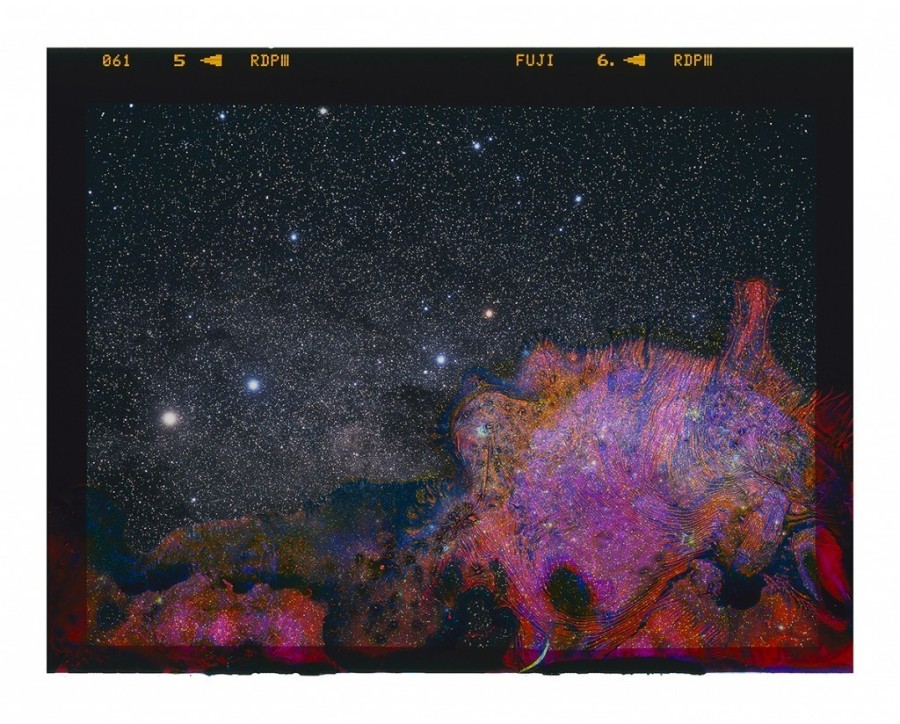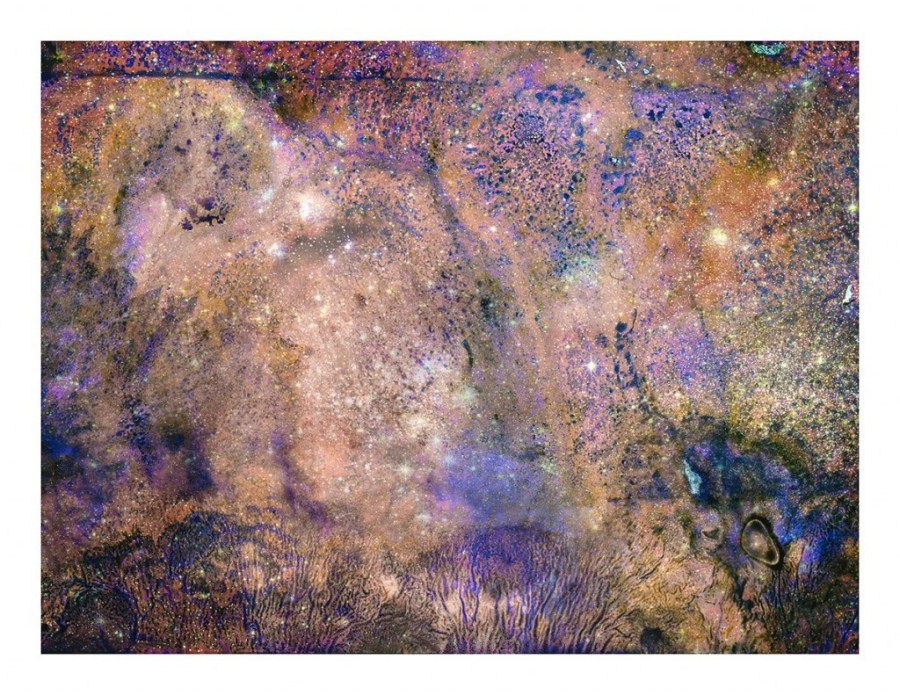“Man is equally incapable of seeing the nothingness from which he emerges and the infinity in which he is engulfed.”
So reads the quote of French mathematician Blaise Pascal, emblazoned across the top of photographer Marcus DeSieno's website. There's probably no better phrase to describe the sublime oddity that is the artist's series "Cosmos." In essence: he allows bacteria gleaned from the seats of toilets and the bottoms of motel hot tubs to eat away at images of the universe -- elliptical galaxies, planets, nebulae and all. The "microscopic and macrocosmic coalesce" into a whole new universe that looks something like this:

A Photograph of the Milky Way Eaten by Bacteria Found in Unpasteurized Milk (Archival Pigment Print of Bacteria Grown on Photographic Film, 2014)
So how does he do it? First, he grows microscopic bacteria atop photographic film. The film contains appropriated images of outer space, originally taken by Hubble, NASA and the ESA (European Space Agency), depicting everything from Venus to the Reticulum Constellation. The bacteria come from various locations, some more heinous (an asshole, a public bathroom) than others (a seemingly harmless iPhone screen, a friendly light switch). DeSieno then lets the bacteria breed, growing and multiplying, interacting with the film in slow and unpredictable ways. The results are scanned to make the final prints. That process, the artist writes, kills the microscopic ecosystem that he himself helped create.
Just as the bacteria consumed the cosmos, deleting its colors and shapes, DeSieno's photographic experimentation obliterates the bacteria, leaving neither party untouched in the end. It's carnage all around, a repetitive cycle of destruction that doesn't even end with the pictures. "The nature of photography itself is called into question," the artist writes in a statement online, "as the bacteria eats away the image into material abstraction, demolishing the pictorial, and freeing the photo-object from the burden of depiction."

A Photograph of a Barred Lenticular Galaxy Eaten by Bacteria Found in My Belly Button (Archival Pigment Print of Bacteria Grown on Photographic Film, 2014)
"The imagery from Hubble and NASA of space, these intangible representations of our larger universe, are destroyed by the very real and tangible invisible forces of nature," DeSieno exclaimed to HuffPost in an email interview. "Nature attacks and alters the surface of the material film, annihilating the original indexical image and imprinting its own, becoming a tactile abstraction of color and texture. Can a photograph be more than a mere index or referent? And how can the use of this analog photographic technology be re-imagined in the 21st century?"
In the end, the manipulated photos, part appropriation/part chemistry, blend aspects of the micro and macro worlds in such a way that the universes end up looking like they belonged together in the first place. Of course, they do. A concept not lost on DeSieno. The infinite just comes sweeping back to us, full of psychedelic bulges and hallucinatory abysses.
"My inspiration for 'Cosmos' comes from three very specific notions. The first is a lifelong fascination with the vast invisible spectrums of the universe. My parents got me a microscope when I was a kid and I would put everything under its lens," DeSieno added. "The second source of inspiration is a desire to interrogate photographic materiality in an age of digital uniformity... The third inspiration is very much an exploration and confrontation with my childhood fears of bacteria and germs as I go out into the world, find various locations, and swab for them as I look for microscopic life. This act is itself a defiant performative gesture against my lifelong neurosis."
Feast on the series below:
A Photograph of the Little Dumbbell Nebula Eaten by Bacteria Found on My Gym’s 20-Pound Dumbbells (Archival Pigment Print of Bacteria Grown on Photographic Film, 2014)
A Photograph of Alpha Centauri Eaten by Bacteria Found on My Asshole (Archival Pigment Print of Bacteria Grown on Photographic Film, 2014)
A Photograph of the Andromeda Galaxy Eaten by Bacteria Found on an ATM (Archival Pigment Print of Bacteria Grown on Photographic Film, 2014)
A Photograph of a Hydrogen Gas Cloud Eaten by Bacteria Found on a Gas Station Pump (Archival Pigment Print of Bacteria Grown on Photographic Film, 2014)
A Photograph of a Star Cluster Eaten by Bacteria Found on My iPhone’s Screen (Archival Pigment Print of Bacteria Grown on Photographic Film, 2014)
A Photograph of a Star Cluster Eaten by Bacteria Found on a Light Switch (Archival Pigment Print of Bacteria Grown on Photographic Film, 2014)
A Photograph of the Whirlpool Galaxy Eaten by Bacteria Found in a Motel’s Heart-Shaped Hot Tub (Archival Pigment Print of Bacteria Grown on Photographic Film, 2014)
A Photograph of the Pleiades Star Cluster Eaten by Bacteria Found on a Public Bathroom’s Door Handle (Archival Pigment Print of Bacteria Grown on Photographic Film, 2014)
A Photograph of the Crab Nebula Eaten by Bacteria Found on a Table at a Red Lobster Restaurant (Archival Pigment Print of Bacteria Grown on Photographic Film, 2014)
A Photograph of a Solar Flare Eaten by Bacteria Found on the Inside of My Shoe (Archival Pigment Print of Bacteria Grown on Photographic Film, 2014)
A Photograph of an Elliptical Galaxy Eaten by Bacteria Found on My Toilet Seat (Archival Pigment Print of Bacteria Grown on Photographic Film, 2014)
A Photograph of the Reticulum Constellation Eaten by Bacteria Found on My Television’s Remote (Archival Pigment Print of Bacteria Grown on Photographic Film, 2014)
A Photograph of the Planet Venus Eaten by Bacteria Found Inside of a Vagina (Archival Pigment Print of Bacteria Grown on Photographic Film, 2014)
Support HuffPost
Our 2024 Coverage Needs You
Your Loyalty Means The World To Us
At HuffPost, we believe that everyone needs high-quality journalism, but we understand that not everyone can afford to pay for expensive news subscriptions. That is why we are committed to providing deeply reported, carefully fact-checked news that is freely accessible to everyone.
Whether you come to HuffPost for updates on the 2024 presidential race, hard-hitting investigations into critical issues facing our country today, or trending stories that make you laugh, we appreciate you. The truth is, news costs money to produce, and we are proud that we have never put our stories behind an expensive paywall.
Would you join us to help keep our stories free for all? Your contribution of as little as $2 will go a long way.
Can't afford to donate? Support HuffPost by creating a free account and log in while you read.
As Americans head to the polls in 2024, the very future of our country is at stake. At HuffPost, we believe that a free press is critical to creating well-informed voters. That's why our journalism is free for everyone, even though other newsrooms retreat behind expensive paywalls.
Our journalists will continue to cover the twists and turns during this historic presidential election. With your help, we'll bring you hard-hitting investigations, well-researched analysis and timely takes you can't find elsewhere. Reporting in this current political climate is a responsibility we do not take lightly, and we thank you for your support.
Contribute as little as $2 to keep our news free for all.
Can't afford to donate? Support HuffPost by creating a free account and log in while you read.
Dear HuffPost Reader
Thank you for your past contribution to HuffPost. We are sincerely grateful for readers like you who help us ensure that we can keep our journalism free for everyone.
The stakes are high this year, and our 2024 coverage could use continued support. Would you consider becoming a regular HuffPost contributor?
Dear HuffPost Reader
Thank you for your past contribution to HuffPost. We are sincerely grateful for readers like you who help us ensure that we can keep our journalism free for everyone.
The stakes are high this year, and our 2024 coverage could use continued support. If circumstances have changed since you last contributed, we hope you’ll consider contributing to HuffPost once more.
Already contributed? Log in to hide these messages.















